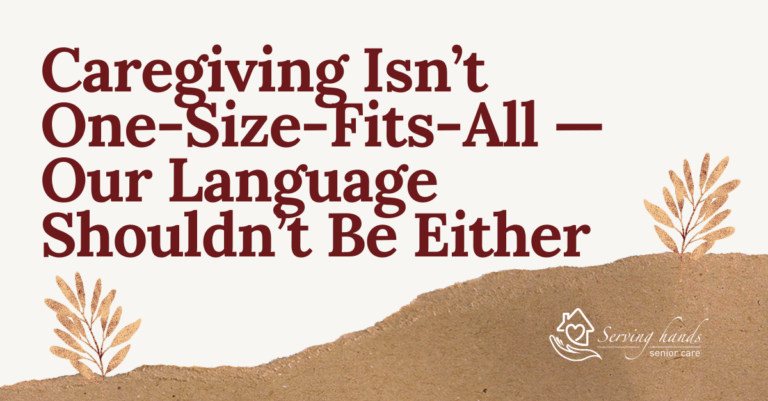A reflection on why inclusive, non-assumptive language matters in dementia and senior care — and how thoughtful wording helps caregivers feel seen, supported, and understood.
Rethinking “Loved Ones”: How Language Shapes Dementia Care
In senior care, the words we choose matter more than we think.
They don’t just describe what we do — they shape how people feel about their experiences, their relationships, and the support they receive. This is especially true in dementia care, where emotions often run deep and family dynamics can be complex.
For years, like many organizations, we’ve used warm, familiar language. At Serving Hands Senior Care, our commitment has long been expressed as:
“to care for your loved ones as we would our own.”
It’s sincere. It reflects how we want people receiving care to be treated — with compassion, dignity, and respect.
But over time, we’ve come to see that the phrase “loved ones” doesn’t fit every caregiving story. And that realization has led us to rethink the language we use.

When “Loved Ones” Doesn’t Fit
In many families, caregiving is absolutely an act of love.
A spouse caring for a partner of 50 years. An adult child stepping in for an ageing parent. A grandchild who rearranges their life to support a family elder.
These stories are real — and they matter.
But they’re not the only stories.
We also support caregivers who step into the role because:
- They are the only family member living nearby.
- Cultural or family expectations leave them feeling they “should” help.
- There are old hurts, distance, or unresolved conflict in the relationship.
- The emotional connection is complicated — or simply not there.
- They feel obligated, responsible, or like there is no other option.
These caregivers still show up. They coordinate appointments, manage medications, arrange in-home support, and make impossible decisions. They carry emotional and logistical burdens that others may never see.
For them, hearing constant references to “your loved one” may not feel honest. Sometimes it can even create guilt:
“If I don’t feel the way I’m ‘supposed to’… does that make me a bad caregiver?”
The answer is no. It makes them human.
And that is exactly why language matters.
Language as a Form of Care
In person-centred dementia care, we talk about dignity, respect, and meeting people where they are.
That principle should apply not only to the person living with dementia, but also to those supporting them — whether they’re family, friends, neighbours, decision-makers, or someone who has stepped in out of necessity.
Using more inclusive, neutral language is one way to extend that same respect.
Instead of assuming every relationship fits a loving or close-family narrative, we’re consciously broadening the way we speak and write about care.
At Serving Hands Senior Care, that means thoughtfully balancing phrases like “loved ones” with alternatives such as:
- “the person you care for”
- “your family member”
- “the individual receiving care”
- “a person living with dementia”
- “your senior”
- or simply using their name
These phrases may sound simple.
But they create space for many different realities — loving, complicated, distant, obligated, strained, or somewhere in between.
They give caregivers permission to tell the truth about their experience, without feeling judged by the language around them.

This Isn’t About Changing Our Values
It’s important to say this clearly:
We are not stepping away from our belief that people receiving care should be treated as treasured, valued individuals.
If anything, this reflection has strengthened that belief.
Our goal is still to offer care that is:
- Compassionate
- Respectful
- Reliable
- Grounded in dignity and personhood
What is changing is our awareness that:
- Caregivers come from many different emotional starting points.
- Relationships affected by dementia can hold both love and loss, affection and frustration, duty and grief.
- Not everyone feels comfortable with language that assumes closeness or affection.
By adjusting our words, we’re aligning our communication more closely with the real-world experiences of families — not just the idealized ones.
Small Shifts, Real Impact
Does changing a phrase from “your loved one” to “the person you care for” change the hands-on care we provide?
Not directly.
But it does change something important:
- How included caregivers feel in the conversation
- Whether their complex emotions are acknowledged instead of quietly ignored
- Whether our messaging makes room for the full spectrum of caregiving experiences
- Whether someone feels safe enough to reach out for help
In practice, this looks like:
- Offering space in assessments for caregivers to share how they really feel
- Avoiding assumptions about family harmony or closeness
- Recognizing caregivers who may feel conflicted, overwhelmed, or alone
- Ensuring our team is trained in inclusive, non-assumptive communication
These are small relational shifts — but they can make a meaningful difference in how supported families feel.

A Call to Reflect Across the Sector
This reflection isn’t about policing language or suggesting that using “loved ones” is wrong. Many families use the phrase and find comfort in it — and truthfully, so do we.
Instead, it’s an invitation for all of us in senior care, dementia support, and health services to gently pause and ask:
- Who might feel unseen by the words we’re using?
- Are we unintentionally idealizing caregiving in a way that doesn’t match everyone’s reality?
- Could small changes help families feel more understood?
For us at Serving Hands Senior Care, the answer has been yes.
And so, we’re choosing language that:
- Holds space for love and obligation
- Recognizes both closeness and complexity
- Respects the dignity of the person living with dementia
- And honours the caregiver — whatever their emotional story may be
Because both journeys matter.
Moving Forward With Intention
As we continue supporting families across Stony Plain, Spruce Grove, St. Albert, Edmonton, and surrounding communities, we carry this reminder with us:
Thoughtful language is part of thoughtful care.
Caregiving, especially in the context of dementia, is rarely simple. But it is deeply human.
If you’re navigating that path — whether you feel loving, conflicted, obligated, devoted, or somewhere in between — you deserve to be seen, heard, and supported.
And we are here to walk alongside you.
Serving Hands Senior Care
Person-centred in-home care and Memory Care support in Stony Plain • St. Albert • Spruce Grove • Edmonton & area
- Why Inclusive Language Matters in Dementia and Senior Care - November 25, 2025
- Can Seniors with Dementia Live Alone? - June 19, 2025
- Tail-Wagging Therapy:How Dogs Can Lift Senior’s Spirits - May 28, 2025


